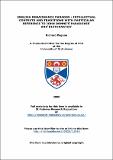English Renaissance paradox : intellectual contexts and traditions with particular reference to John Donne's ̀Paradoxes' and ̀Biathanatos'
Abstract
This study examines the intellectual background of the paradoxes of John Donne. In the first chapter, the classical foundations of the concept of paradox are detailed.
These foundations reflect basic philosophical differences which are manifest in a writer's approach to the defence of a paradox or uncommon opinion. The first
chapter also discusses the derivation of classical concepts of paradox by sixteenth century writers in an effort to correlate these concepts with the respective philosophical positions with which Donne would have been familiar. The second chapter focuses on the dialectical procedure of the thesis. Aristotle explicitly associated the thesis with paradox, and he delineated its fundamental role in the investigation of contested speculative questions. Cicero adapted it to his rhetorical theory but continued to observe its essentially dialectical character. In the sixteenth century, writers on both rhetoric and logic drew heavily on the works of Aristotle
and Cicero for their own formulations of the thesis. These formulations reflect precisely the relationship which Aristotle and Cicero observed between the paradox and the thesis. The third chapter begins by examining the challenge posed by Peter Ramus to the Aristotelian dialectic upon which the scholastic curricula of European universities was based. Donne's English contemporaries, Gabriel Harvey and Thomas Nashe, disagreed on the value of Ramus' innovations, and their comments on them in their quarrel reveal an awareness of the profound epistemological ramifications of Ramus' denial of the sceptical use of the thesis which Aristotle had observed in his Topics. The fourth chapter details those epistemological theories which competed with Ramus' neoaristotelianism. The majority of these theories are neoplatonic; they exhibit the characteristic features of Platonic Idealism which Aristotle had rejected in his Metaphysics, and which would be later rejected by Aquinas. Donne was familiar with these neoplatonic alternatives and was not wholly unreceptive to them. However, he explicitly denies the value of neoplatonic theories of mind for the practical affairs of Christian life, and maintains that the doubt implicit in matters to which revelation and reason have not delivered absolute
precepts insures the viability of paradoxical opinions. The fifth chapter compares Donne's Aristotelian notion of paradox with other paradoxes of the sixteenth century. Through this comparison, the scholastic foundation of Donne's dialectical argumentation is exposed. Once exposed, his characteristic tentativeness with regard to the doctrinal differences of his day is understood to be a consequence of his Aristotelian and Thomist regard for the difficulty with which reason attains knowledge. The sixth chapter examines Donne's paradox and thesis, Biathanatos, in light of the Thomist principles which it employs in its exposition of the problem of suicide. Throughout Biathanatos Donne criticizes the value of Augustine's moral doctrine in practical life, and accepts an epistemological doctrine which accommodates doubt and error in the manner detailed by Aquinas and denied by Augustine. It is with this doubt and error in mind that Donne's paradox proceeds towards its conclusion's request for charitable interpretation, an interpretation which is informed specifically by Aquinas' doctrine of charity.
Type
Thesis, PhD Doctor of Philosophy
Collections
Items in the St Andrews Research Repository are protected by copyright, with all rights reserved, unless otherwise indicated.

